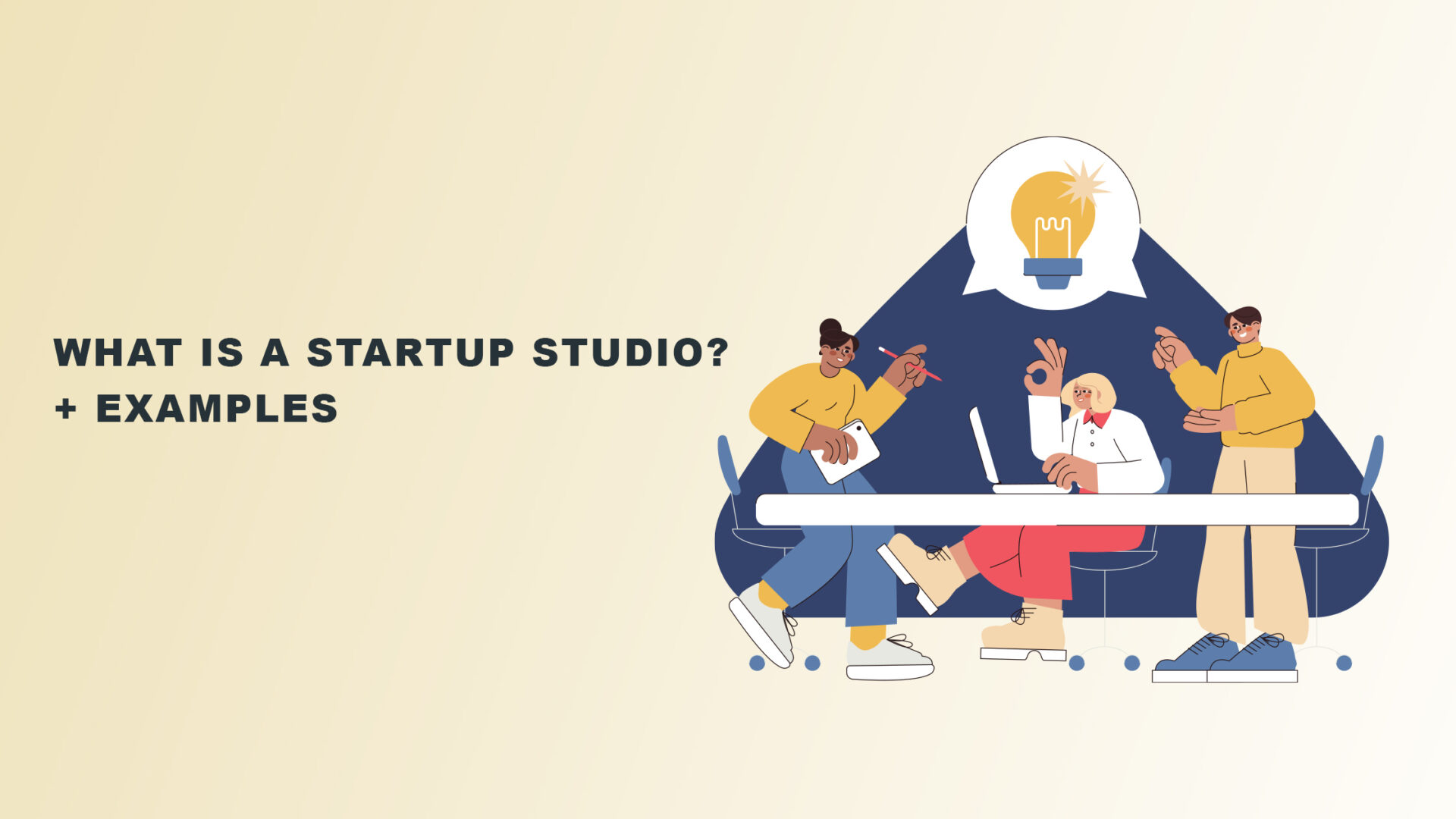If you can’t seem to fuel your startup’s success, why not join a startup studio?
Approaching a startup studio is a viable solution because these places will take you under their wing and help you get out there.
Besides, not to rain on your parade or anything, but you should know that 9 out of 10 startups fail.
Yes, some failures are because of terrible startup ideas and value propositions. But, most startups fail because of poor execution — a lack of resources, an absence of market demand, an overwhelming amount of competition, and more.
Want an alternate and promising fate for your startup? Then, take this advice: ask for help from startup studios.
Fortunately, this article will help you. Here, we’ll discuss everything you need about a startup studio.
We’ll even throw in a bunch of startup studio examples. This way, you can have a clear sense of what it is.
What is a startup studio?
A startup studio is an organization that helps launch startups using its pooled money and other resources. An intriguing way to look at it is to consider it a startup that creates startups — where brilliant ideas “hang out.”
Because of this, many people are fond of its startup building concept and would refer to it using alternative names like startup factory, startup foundry, and venture studio.
Here are the features of typical startup studios:
- The goal is to develop a disruptive business idea or join forces with innovative minds and entrepreneurs.
- It’s where startups can engage with the vast majority of experienced founders and co-founders, investors, and market experts.
- It’s also where the members of startups meet fellow startup members to talk about ideas.
Startup studios vs. startup incubators vs. startup accelerators
Start-up incubators
Startup incubators are cohort-based entities that cater to less-developed or very early-stage startups. They also welcome anyone new (with a futuristic potential) to the startup world.
They may be small business entrepreneurs who, despite not having a dedicated team, have an unwavering will to succeed.
Typical startup incubators create local connections, offer mentoring programs, and provide co-working spaces.
They also help new startups with team building, business ideation opportunities, and startup building.
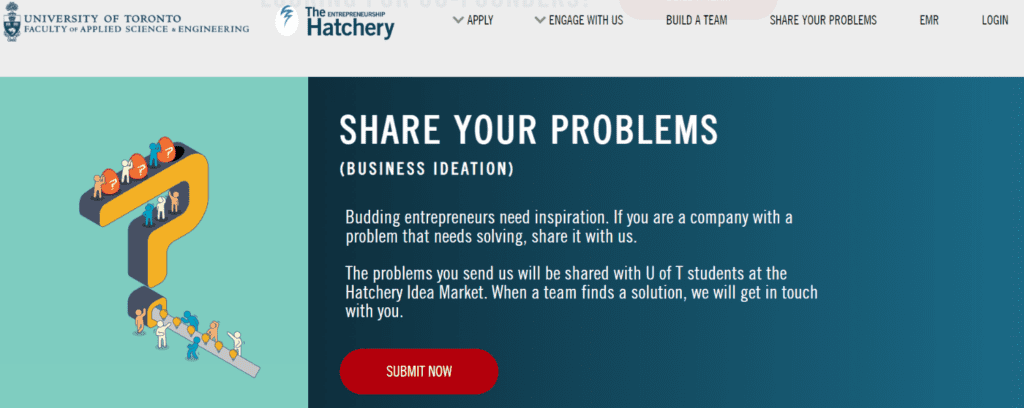
An example is the University of Toronto’s (UoT) Entrepreneurship Hatchery. It stays true to its motto: “We Create Startups and Entrepreneurial Human Capital.” And it fosters the entrepreneurial spirit of UoT students.
The Hatchery is the funding incubator behind innovative teams like
- Indus (the inventor of 3D-printed soil)
- Toothpod (the developer of chewing gum for cleaner teeth)
- Themis (the group that uses AI to produce contracts for lawyers)
Startup accelerators
Startup accelerators are also cohort-based entities or programs. Their defining feature is that they assist well-developed startups with brilliant internal ideas.
Often, they team up with experienced entrepreneurs, wealthy investors, large enterprises, venture capitalists, and venture capital firms.
The idea is to help scale the startup model and accelerate its growth in a short period (like three months).
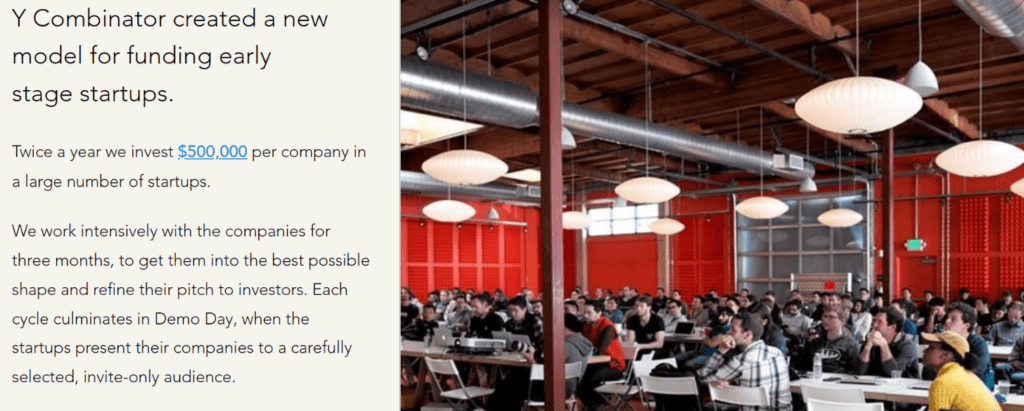
An example is Y Combinator, an American tech startup accelerator specializing in batch funding. It’s the startup accelerator behind well-known startups like
- Airbnb (an operator of an online marketplace for tourist activities and other means of lodging)
- Reddit (a social news aggregator, discussion website, and content rater)
- Twitch (a live streaming service)
Startup studios
Like startup incubators and startup accelerators, startup studios develop human capital. They build startups and assist them in creating successful businesses.
What makes startup studios stand out is that it welcomes startups of all levels and budding entrepreneurs with market-tested disruptive ideas. Whether a startup is underdeveloped or is at a close point to launching, startup studios provide help.
Below is a table containing an overview of their differences.
| Goal | Time Frame | Joining | Financing | Benefits | |
| Startup Studios | Build startups from scratch and use startup studio teams to build these startups | No fixed time frame to provide flexibility in growth | Very hard to get into; Mostly accept entrepreneurs from internal teams | Enable access to pooled resources; highly likely to finance startup operations | Provide access to vast resources; can match founders to form a team |
| Startup Incubators | Help startups get the first customer; flexible management processes | No fixed time frame to allow iterations and pivots | Challenging application process; typically accept solo founders | Provide financial capital in exchange for proof of concepts | Provide free workspace, financial capital, and a deep network of mentors and industry experts |
| Startup Accelerators | Align investors with startups to facilitate fast innovation | Fixed time frame; typically split into 2-3 cohorts | Set clear application protocols; flexible internal screening mechanisms | Expect equity exchange for other resources and expert help | Offer structured programs with curriculums |
Startup studio business model and how it works

The business model of startup studios revolves around providing help with strategic planning and technical savviness — two critical aspects of a successful business. As a result, they have a pivotal role in the positive transformation of startups.
They can help any budding startup aim high because they follow a step-by-step process. And by following this systematic process, they can think long-term and devise a blueprint or roadmap to a startup’s success.
Below are its business processes.
Ideation
At an initial stage, startup studios assist startups in making a business case out of ideas. And to help generate ideas for business use cases, they undergo brainstorming sessions.
Here are some brainstorming techniques:
- Rolestorming – Assume the role of someone with a brilliant mind and think like them. Then, come up with the most extravagant ideas if you can.
- Associative brainstorming – Focus on a single startup idea. Then, write down every association. The objective is to trigger your mind and inspire it to work more effectively.
- Freestorming – Find a peaceful area where you can entertain every idea in your mind. It doesn’t matter if these ideas are on the brink of insanity — write them down.
Validation
When ideas are on the table, startup studios proceed with validation—focusing on feasibility and scalability. If an idea passes validation, startup studios will move it past the idea stage and forward it to the next stage.
The typical validation process involves the following:
- Conducting market research – Listening to the public and understanding pain points allows a startup to provide a good product or improve its current offering. Market research is also how they learn about influential and trending issues, overserved or underserved needs, and more.
- Running pre-designed tests – Building prototypes is a practical approach. Forward these to an audience and note their responses to see if these prototypes are viable.
- Create the first product specifications – Welcoming feedback and detailed discussions will help. Prepare to revise specifications, if necessary.
- Identifying unsuitable ideas – Exploring weak or problematic areas is a way of guaranteeing an environment of futile-free ideas. The focus should be on clarity, usability, and scalability.
- Gathering supporting evidence – Examining an opposing idea can help determine a better position. Write down the reasons that detail how the said position is better. Then, prioritize the more descriptive ones.
Creation
It’s where startup studios convert the validated ideas of startups into working businesses. They create an MVP or Minimum Viable Product to make this happen.
They also create an MVP for partners and customers to achieve two goals:
- Explain the usage of the idea – Startup studios elaborate on how to use the product in line with the business idea. Also, they provide in-depth discussions, point out strengths and weaknesses, and include the best use cases.
- Strengthen the product-market fit – After learning about the market demand, startup studios help startups build products based on this demand and design a better alternative than those from competitors.
Spinout
At this point, startup studios establish a business case. Then, the studio team adds a startup to their portfolio companies—gearing them up with an excellent support team.
Here, the main event is how a startup studio takes a step back. It may recognize its vital role in launching startups and building companies. But, it also knows that for a startup to succeed, this startup needs to work with autonomy and find its own identity.
Here are ways startups work better if given autonomy:
- Prove dependability – Assigning higher roles allows them to take proactive approaches and be dependable. It’s also an opportunity for them to shine — show initiative and undertake more responsibilities.
- Enhance radical thinking – Privileging them with the freedom to work using their techniques ignites creative thinking skills. It also reduces stressful methods and increases self-confidence and motivation.
- Shape professional goals – Encouraging them to work on their own — as long as they adhere to regulations — helps them carve a successful path toward their goals. For example, they can also develop organizations built on trust and inclusion. It is the case if a startup studio exposes them to an atmosphere of trust and inclusion.
Scaleup
At this concluding stage, startup studios create layered management systems. Then, they prioritize scale-up efforts. If they successfully help startups in this, they can wrap up. Ideally, startups will prepare to go public or for an acquisition.
Here are ways how startup studios can help in the scale-up stage:
- Provide networking opportunities – Introduce startups to the startup world. They can also put them in front of a network of investors, venture capitalists, or anyone searching for the next big idea.
- Create marketing campaigns – Emphasize that marketing is a growth hack. With strategic marketing campaigns and a fine-tuned business plan, startups can scale rapidly or at their pace of choice.
- Streamline repetitive processes – Offer guidance and point to less critical tasks. Startups can automate and outsource some affairs — optimizing their operations.
Startup studio examples in 2022
Symalite Labs
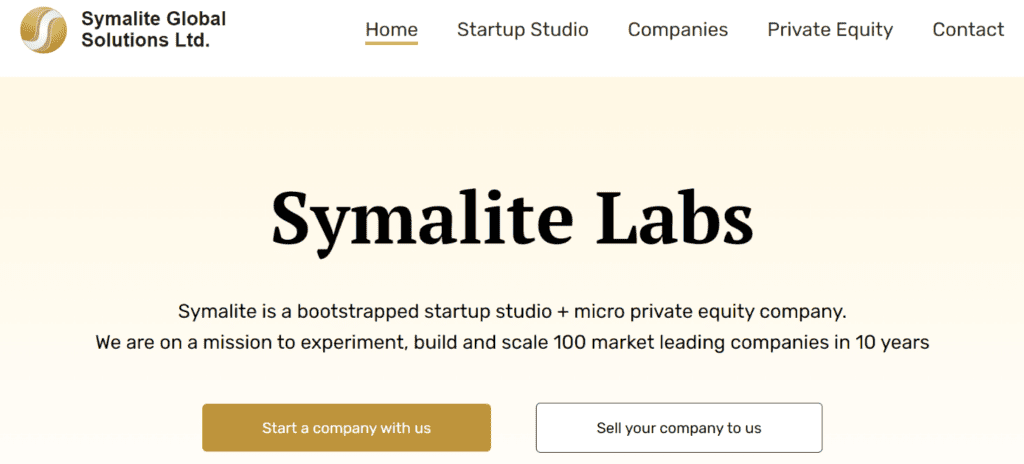
Symalite Labs is a bootstrapped startup studio and micro-private equity company. Its mission is to play a role—experiment, build, and scale—a hundred market-leading companies in 10 years.
So far, it has helped lots of startups. Examples are GroupLeads (a company that creates group funnels) and ChatSilo (a service provider of Facebook Messenger CRM and productivity).
Unique features:
- Focus is on the subscription companies in B2B SaaS, artificial intelligence, Chrome extensions, and productized services
- $12 million+ transactions, 15,000+ total users, and 14 software programs
- Leverages design and focuses on turning ideas into usable products for end users
- Provides resources in the areas of product design, marketing, engineering, and operations
Pioneer Square Labs

Pioneer Square Labs is a renowned startup studio and venture capital company. Since it launched in 2015 in Seattle, Washington, it has been developing one disruptive business idea after another.
It follows the 1st Co-Founder Startup Studio Model. Like any studio using this model, it gives importance to partnerships. It’s also active in taking and receiving pitches from entrepreneurs with genius-level ideas but zero resources.
A sea of entrepreneurs and startups benefit from its funding. Two are Panda AI (a team that developed a B2B artificial intelligence tool) and Shipium (founders of a modern shipping platform for retail and e-commerce).
Unique features:
- Investors are highly invested partners who want to be involved at every stage and in every venture
- 50/50 equity split with partners
- The entrepreneur with the original idea may remain as CEO or COO
Hangar
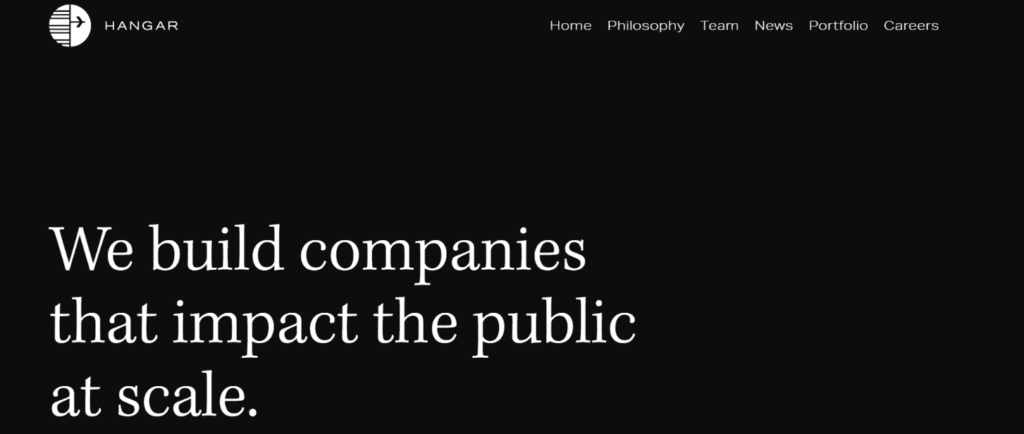
Hangar focuses on the public sector and offers an efficient network of public professionals and top-notch resources to public startups. Its goal is to create a positive impact on people’s lives. And identifying areas where technology can help is how it plans to achieve it.
It’s a 2nd Co-Founder Startup Studio Model. It caters to startups who may (almost) have everything going for them—an idea and MVP. But, because these startups need specific resources and expertise, it enters the scene.
Familiar with Cornea? It’s a laudable group that provides life-saving resources and real-time information to first responders. You should know it’s one of the startups that this startup studio launched.
Other startups it helped are Roster (a for-profit company that provides automated expense software to small and mid-sized businesses) and Camber Systems (a tech company specializing in commercial data analytics).
Unique features:
- The equity split favors the startup; for example, 75% of the equity goes to the founding team and 25% to the startup studios
- Provides what startup founders need the most (tech support, operational help, and connections)
- Accommodates startups that operate in Stealth mode
Beeso
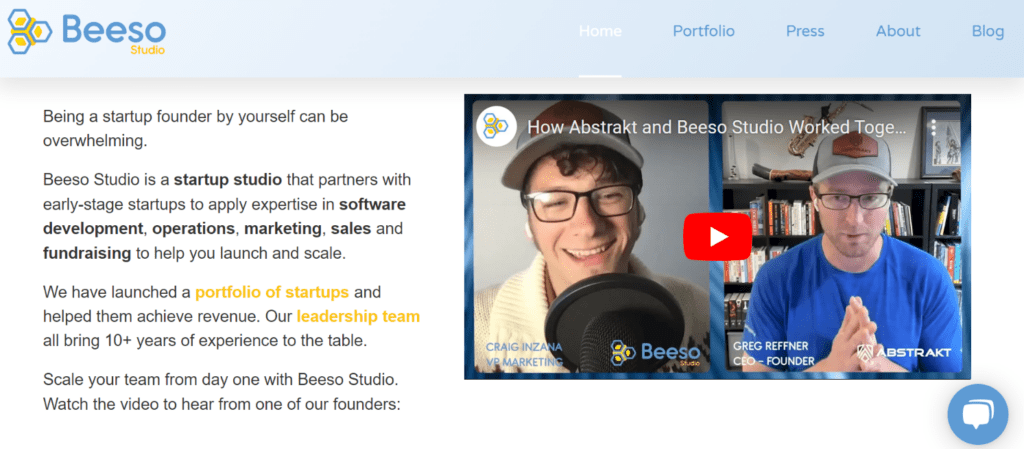
Beeso is a startup studio and venture builder based in Omaha, Nebraska. It works on large enterprise projects and tech startups — wearing its experience up its sleeves.
It follows the 3rd Co-Founder Startup Studio Model. It’s the ideal solution for entrepreneurs who have brilliant ideas.
But while they have brilliant ideas, they need help with everything else — aligning sales and marketing departments, developing viable product models, and streamlining growth objectives.
Most startups that benefited from its assistance are those from Omaha, such as Atlas Lab Safety (laboratory safety and compliance software) and Loophire (a recruiting platform that uses AI and machine learning). And it also extends help to startups based outside its hometown.
A couple of examples are MusiQcast (a platform for publishing and sharing music videos) and Pluck (an open-video talent resource for the hospitality and restaurant industries) in London.
Unique features:
- Provides lots of assistance and does most of the (initial) heavy lifting
- Requires a larger equity share (typically, 25%) than other startup studio models
- Provides “growth hacking” expertise
Differential

Differential is a corporate startup studio and remote-friendly product agency. Its objective is to prepare startups for their big break and help with their next venture. In addition to helping startups leave their nests with well-developed products, it also focuses on technological advancements and corporate innovations.
It follows the Builder Outsource Startup Studio Model. From an outsider’s perspective, it appears as a “service for hire” company. But a closer look will tell you a collaboration (between Differential and a startup or established company) is happening. Because it collaborated with a startup, it requires equity.
Lexmark, a manufacturer of innovative technologies and imaging solutions, is a company that partnered with it to unlock growth opportunities. Other examples are Big Ass Fans (a supplier of fans and evaporative coolers), and TaylorMade (a sports equipment manufacturer)
Unique features:
- Takes over the engineering side of projects and ensures happy board members
- Provides a futuristic business plan and short-term support
- Offers consultations for feature add-ons and product shaping
Final thoughts: should you go for a startup studio?
Being a part of a startup can be rewarding. But it’s risky. You may even reach a point where you think failure is inevitable.
The truth is that it’s not.
While failure is part of having an appetite for tackling risks, many struggling startups can avoid it. And the practical way to avoid failure is to have a reliable support ecosystem.
If you’re struggling but believe you have a one-in-a-million idea, decide to join a startup studio.
With a startup studio, you can secure funding. You can also target the right goals, build valuable products, and more. Plus, you can gear up with the ability to grow and discern if pivoting is an ideal course of action.

